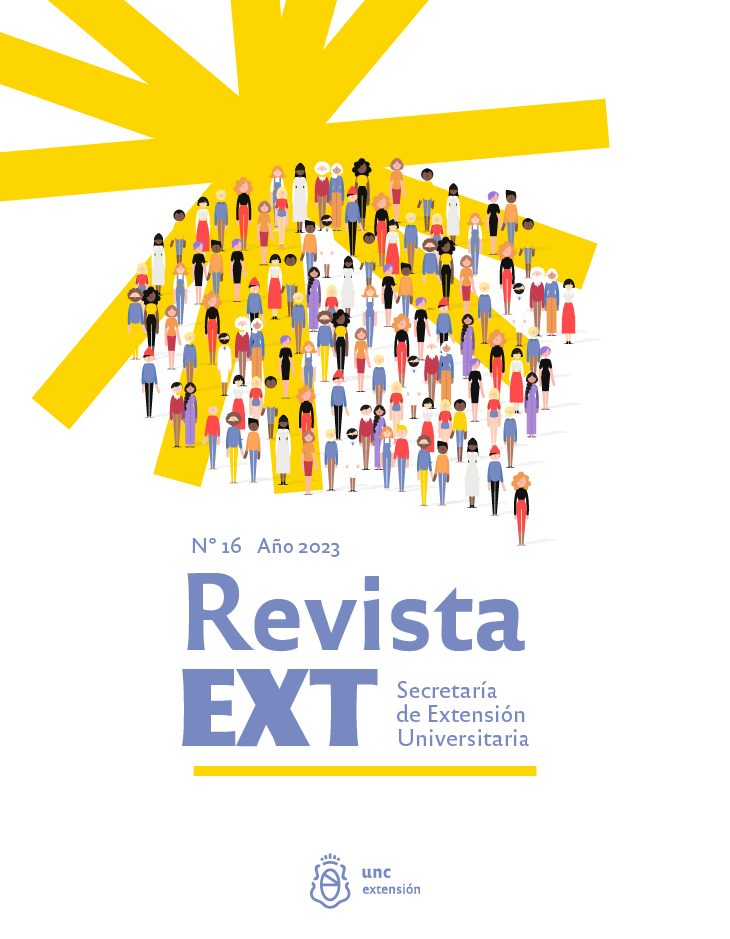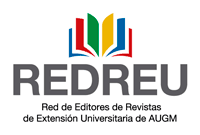Extension at the National University of Cordoba: Working with the voice
Keywords:
health; voice; teaching; practices; extensionAbstract
Speech therapy as a discipline allows us to provide spaces in the field of university extension that raise awareness, recover and develop the expectation of a work voice with greater possibilities, compared to the use of colloquial voice. To this end, workshops are implemented in the different academic units, bringing together possible strategies to improve the working conditions of university professors. Together with the production of knowledge focused on the territorial context of the experiences, and with an axis in communication, actions are developed in collaboration with the Occupational Health Program of the Association of University Teachers and Researchers of Córdoba (ADIUC).
This work describes the experience which focuses on the problem of occupational vocal health through the ADIUC Occupational Health Program, which targets university professors, who work using their voice on campus and in the high schools that depend on the University of Córdoba. The contexts are varied and challenging regarding a colloquial voice, which in many cases shows vocal symptoms.
“Working with the voice” links the School of Speech Therapy, Faculty of Medical Sciences, UNC, and ADIUC through outreach actions. This proposal is based on a device that has as a precedent the Specific Agreement between ADIUC and the School of Speech Therapy, Faculty of Medical Sciences (Resolution 4745/2019).
Downloads
References
Cobeta, I., Nunez, F., & Fernandez, S. (2023). Patología de la voz (2nd ed.). Marge Books.
Farías, P. (2018). Diagnóstico de la función vocal en voz ocupacional: la disfonía del docente calificada según la CIF. Areté. https://doi.org/10.33881/1657- 2513.art.18204
Herrera Ariza JLA, Castro-Rojas JA. Disfonía ocupacional en docentes. Revisión de la literatura. Acta otorrinolaringol. cir. cabeza cuello. 2018;46(1):62-70Kang, J., Xue, C., Chou, A., Scholp, A., Gong, T., Zhang, Y., Chen, Z., y Amp; Jiang, J. J. (2019). Comparing the exposure-response relationships of physiological and traditional vocal warm-ups on aerodynamic and acoustic parameters in untrained singers. Journal of Voice: Official Journal of the Voice Foundation. Recuperado de https://doi.org/10.1016/j.jvoice.2017.12.019
Pérez, G., y Gallardo, M (2019). La voz: cualidades de la voz - clasificación, defectos e higiene de la voz. Recuperado de http://repositorio.une.edu.pe/handle/20.500.14039/4306
Portillo, M. P., Rojas, S., Guzman, M., &Quezada, C. (2018). Comparison of effects produced by physiological versus traditional vocal warm-up in contemporary commercial music singers. Journal of Voice: Official Journal of the Voice Foundation. Recuperado de https://doi.org/10.1016/j.jvoice.2017.03.022
Torres Olivares, C. (2020). Efectos del Calentamiento Vocal en Profesionales de la Voz : revisión sistemática de la literatura. Recuperado de http://repositoriobibliotecas.uv.cl/handle/uvscl/1828
Downloads
Published
Issue
Section
License
Copyright (c) 2023 Secretaría de Extensión Universitaria

This work is licensed under a Creative Commons Attribution-NonCommercial-ShareAlike 4.0 International License.
Aquellos autores/as que tengan publicaciones con esta revista, aceptan los términos siguientes:
- Los autores/as conservarán sus derechos de autor y garantizarán a la revista el derecho de primera publicación de su obra, el cuál estará simultáneamente sujeto a la Licencia de reconocimiento de Creative Commons que permite a terceros compartir la obra siempre que se indique su autor y su primera publicación esta revista.
- Los autores/as podrán adoptar otros acuerdos de licencia no exclusiva de distribución de la versión de la obra publicada (p. ej.: depositarla en un archivo telemático institucional o publicarla en un volumen monográfico) siempre que se indique la publicación inicial en esta revista.
- Se permite y recomienda a los autores/as difundir su obra a través de Internet (p. ej.: en archivos telemáticos institucionales o en su página web) después del proceso de publicación, lo cual puede producir intercambios interesantes y aumentar las citas de la obra publicada. (Véase El efecto del acceso abierto).





